Welcome to the July 2014 issue of the Global Washington newsletter. If you would like to contact us directly, please email us.
IN THIS ISSUE
- Letter from Our Executive Director
- GlobalWA’s 6th Annual Conference
- Question of the Month
- Global Development in the News: The Millennium Development Goals: What Happens After 2015?
- Featured Organization: Landesa and its “Security for Girls Through Land Project”
- Changemaker: Britt Yamamoto, Ph.D., Executive Director and Founder, iLEAP
- Member Recognition: World Population Day 2014: Planned Parenthood of the Great Northwest Making an Impact Locally and Globally
- Welcome New Members
- GlobalWA Member Events
- Career Center
- GlobalWA Events
Note from our Executive Director
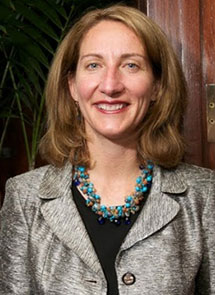 Phuket in February and Seattle in August. Many Washingtonians working in global development plan their international travel for the fall and winter so that they can be home to enjoy our state’s glorious summer. And, why not? For many, July is a month where work slows down, happy hours become more frequent, and there are weekly opportunities to get out and meet with peers. All of this means that summer is a busy time for Global Washington.
Phuket in February and Seattle in August. Many Washingtonians working in global development plan their international travel for the fall and winter so that they can be home to enjoy our state’s glorious summer. And, why not? For many, July is a month where work slows down, happy hours become more frequent, and there are weekly opportunities to get out and meet with peers. All of this means that summer is a busy time for Global Washington.
We have several upcoming events to showcase our members to new audiences. Global Washington is working with Russell Investments to present speakers who will raise awareness among local Russell employees on topics such as impact investing, microcredit, and sustainable development. We are also working with several elected officials, including Congressman Adam Smith and Congressman Jim McDermott, to provide our members with opportunities to engage directly with these officials and their staffs to talk about the issues that you care about.
Lastly, please make sure to mark your calendar for the 6th Annual Global Washington Conference on December 3, 2014. Participants will include NGO practitioners, CSR business executives, research experts, philanthropists, and others working on global issues. Conference sessions will highlight successful partnerships, groundbreaking innovations, and productive failures within global development. We plan on having our most successful conference yet, and I hope all of you plan to be there.
Enjoy the beautiful weather over the next month and I hope you can take advantage of summer gatherings to catch up with old friends and make new connections. I look forward to seeing all of you very soon.

Kristen Dailey
Executive Director
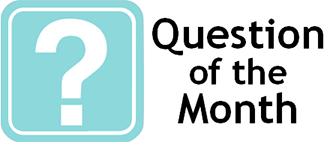
GlobalWA will ask you a question every month and synthesize the responses and make available to our member organizations. Please take a moment to respond to the question for this month:
The 6th Annual GlobalWA Conference is on December 3, 2014. What are you most looking forward to at this year’s conference and/or who would you like to hear speak?
Global Development in the News
The Millennium Development Goals: What Happens After 2015?
By Sam Wolff
At the turn of the century, the United Nations created the eight Millennium Development Goals (MDGs), which range from vastly reducing extreme poverty to halting the spread of HIV/AIDS to providing universal primary education. The target date to achieve the goals is 2015. The drafting process has begun for post-2015 goals, also known as the Sustainable Development Goals (SDGs), which will likely play a large role in shaping the future of the world’s developing economies and the international economy.
Here is a primer on the original MDGs that were determined in 2000. They are:
- Eradicate extreme poverty and hunger
- Achieve universal primary education
- Promote gender equality and empower women
- Reduce child mortality
- Improve maternal health
- Combat HIV/AIDS, malaria, and other diseases
- Ensure environmental sustainability
- Develop a global partnership for development.
These goals were founded upon a premise formulated and agreed upon by world leaders that “in addition to our separate responsibilities to our individual societies, we have a collective responsibility to uphold the principle of human dignity, equality and equity at the global level.” This statement could be a mantra of any global citizen, however, the latter half of the declaration states that, “As leaders, we have a duty therefore to all of the world’s people, especially the most vulnerable and, in particular, the children of the world, to whom the future belongs1.”
The MDG declaration was not only a step towards a more cohesive international community but a marker of a changing culture – a global culture which is aware of and, through the guidance of its leadership, actively pursues a more widely encompassing notion of human identity.
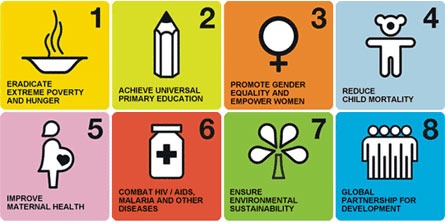 Certainly, the MDG declaration, as with nearly all legislation, was not perfect. Critiques by scholars and the popular media criticized the lack of analysis behind the MDGs’ tenets. One example cited of this under-analysis is the problematic and exasperating nature of World Bank loans to developing economies. Another is the under-emphasis on agricultural development within the MDGs, despite the fact that vast numbers of the impoverished world subsist through agriculture.
Certainly, the MDG declaration, as with nearly all legislation, was not perfect. Critiques by scholars and the popular media criticized the lack of analysis behind the MDGs’ tenets. One example cited of this under-analysis is the problematic and exasperating nature of World Bank loans to developing economies. Another is the under-emphasis on agricultural development within the MDGs, despite the fact that vast numbers of the impoverished world subsist through agriculture.
A possible cause of these perceived flaws alludes to a larger, more problematic theme in MDG-related UN decision making. This was noted by the International Planning Committee for Food Sovereignty (IPC), and it is that those most affected by the MDGs, the globally impoverished, have little say in the courses of action and methods of aid that the MDG provides. As the IPC’s analysis of the MDGs noted, “Why try to reinvent the wheel with this consultation which does not meet the standards of a significant participation of different constituencies of the social groups most affected by hunger and nutrition?”
Nonetheless, significant progress toward meeting the MDGs has been made, according to a 2013 UN report. In regards to the first goal of eradicating extreme poverty and hunger, “poverty rates have been halved,” and in the last two decades, 700 million people have been lifted out of extreme poverty. Nevertheless, “one in eight people still go to bed hungry, despite major progress” and globally, nearly “one in six children under age five are underweight and one in four are stunted.”
While the increments of progress for each of the eight goals vary, this trend is fairly constant. Whether it’s combating preventable disease2, the estimated 863 million people still residing in slums, or persisting trends of species extinction and exploitation of natural resources3, there is more work to be done. As written by UN Secretary-General Ban Ki-moon, “The picture is mixed. We can do better.”
According to the UN, “efforts to achieve a world of prosperity, equity, freedom, dignity and peace will continue unabated. The UN is working with governments, civil society and other partners to build on the momentum generated by the MDGs and carry on with an ambitious post-2015 sustainable development agenda that is expected to be adopted by UN member states at a summit in September 2015.”
The so-called zero draft on the SDGs, released on June 2, lists 17 potential goals to be attained by 2030:
- End poverty everywhere
- End hunger, improve nutrition and promote sustainable agriculture
- Attain healthy lives for all
- Provide quality education and life-long learning opportunities for all
- Attain gender equality, empower women and girls everywhere
- Ensure availability and sustainable use of water and sanitation for all
- Ensure sustainable energy for all
- Promote sustained, inclusive and sustainable economic growth, full and productive employment and decent work for all
- Promote sustainable infrastructure and industrialization and foster innovation
- Reduce inequality within and between countries
- Make cities and human settlements inclusive, safe and sustainable
- Promote sustainable consumption and production patterns
- Tackle climate change and its impacts
- Conserve and promote sustainable use of oceans, seas and marine resources
- Protect and promote sustainable use of terrestrial ecosystems, halt desertification, land degradation and biodiversity loss
- Achieve peaceful and inclusive societies, access to justice for all, and effective and capable institutions
- Strengthen the means of implementation and the global partnership for sustainable development
Clearly, this is a grand declaration of intent and one could say its ambition is matched by the immensity of the problems it faces. Despite great challenges, there is equal reason for optimism. The working editions currently being drafted by UN committees and other national delegates contain numerous tenets along with methods to accomplish them, such as the pledge to, for the goal of promoting sustainable agriculture, “substantially increase small-scale food producers’ productivity and incomes, particularly of women, family farmers and pastoralists through secure access for all to productive resources and inputs, knowledge, financial services and markets.” In light of this, it certainly seems that these new goals contain a more comprehensive and analytical concept of global development than the goals set in 2000.
Perhaps equally important is the language in the post-2015 goals. “We recognize that people are at the centre of sustainable development and, in this regard, we strive for a world that is just, equitable and inclusive, and we commit to work together to promote sustained and inclusive economic growth, social development and environmental protection and thereby to benefit all.”
Compare this language to that of the eight MDGs set nearly 15 years ago. “We will spare no effort to free our fellow men, women and children from the abject and dehumanizing conditions of extreme poverty, to which more than a billion of them are currently subjected4.” The difference in the rhetoric used in the two documents – from “freeing” fellow men, women and children called out in the current MDGs, to recognizing that “people are at the center” of global development and pledging to “work together” in the zero draft of the post-2015 SDGs – it seems that we may be moving to a more inclusive plan of action.
Alongside the more deliberate goals in the zero draft, this language might also be a significant shift. As the post-2015 agenda is still undergoing revision and will not be finalized until next year, only time will tell what the end result will be. But through a comprehensive plan and more cohesive world view, we can look forward to improved outcomes.
1UN Res. 55/2 p.1
2http://www.un.org/millenniumgoals/pdf/report-2013/mdg-report-2013-english.pdf p.24
3http://www.un.org/millenniumgoals/pdf/report-2013/mdg-report-2013-english.pdf p.47
4UN Res 55/2 p.4
Featured Organization
Landesa and its “Security for Girls Through Land Project”
By Gailyn Portelance
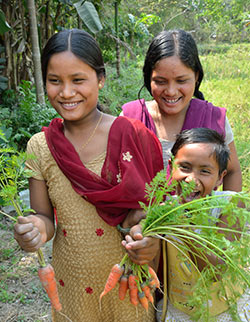 In a village in the rural Cooch Behar district of West Bengal, India – amidst rice paddies, banana trees and other lush green surroundings – a young girl is showing off a radish bigger than her arm that she has grown. She is surrounded by her proud family and neighbors. Another village girl has started a vegetable garden and is growing and selling produce at the local market. She brings home more than half the income her father makes in a day. In another area, a small group of girls has collectively created a plot and are cultivating, selling and dividing income among themselves, all the while creating a new social space to come together.
In a village in the rural Cooch Behar district of West Bengal, India – amidst rice paddies, banana trees and other lush green surroundings – a young girl is showing off a radish bigger than her arm that she has grown. She is surrounded by her proud family and neighbors. Another village girl has started a vegetable garden and is growing and selling produce at the local market. She brings home more than half the income her father makes in a day. In another area, a small group of girls has collectively created a plot and are cultivating, selling and dividing income among themselves, all the while creating a new social space to come together.
They learned these skills thanks to the Security for Girls Through Land Project (also known as the Girl’s Project) sponsored by Seattle-based Landesa, a Global Washington member organization that works to help secure land rights to the world’s poorest people. In this case, it is working to help adolescent girls realize their land rights as they become women.
“Land rights for girls is a trigger point for many issues; we know that with land, women can accrue all types of benefits for themselves, their families, and their communities,” said Melany Grout, an attorney and land tenure specialist for Landesa. “In the immediate term, helping to position girls to realize their land rights has the effect of reducing certain vulnerabilities, including child marriage, adolescent pregnancy, lack of education and malnutrition.”
Launched in 2010, the Girl’s Project is being implemented in partnership with West Bengal’s Department of Women and Child Development (WDC). Together, they are piloting a government-sponsored program called SABLA, which aims to empower adolescent girls through skill development and improvements in health and nutrition. Landesa has successfully encouraged an addition to the curriculum that focuses on land rights, asset creation and land-based livelihoods for adolescent girls.
“It’s one of the most impoverished areas in the state,” said Grout, of the choice to center the pilot program in Cooch Behar. “These are people who don’t generally have enough to eat each day, and the girls are in a tough position because for their families it is often a choice between school and food, and they are not seen as worth investing in in the long term.”
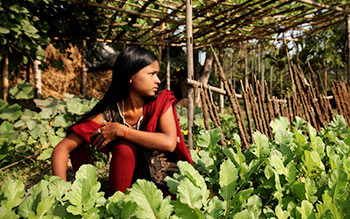 The Girl’s Project has impacted more than 40,000 girls in over 1,000 villages in the district. A recent Landesa report found that participating girls were more likely to stay in school and delay marriage and more likely to have an asset in their own name.
The Girl’s Project has impacted more than 40,000 girls in over 1,000 villages in the district. A recent Landesa report found that participating girls were more likely to stay in school and delay marriage and more likely to have an asset in their own name.
Of certain results of the recent findings, “girls that participated in our project were on average marrying a year and a half later, and we also saw that they were significantly more likely to stay in school at a critical transition age where girls would be more likely to drop out,” said Grout.
Reducing dowry is an important component of the project. The pressure on girls’ families to come up with a dowry drives girls in poor families into early marriage, when marrying a younger girl can mean avoiding a large sum. The Girl’s Project is finding ways to work with the traditional dowry structure to reduce the costs and delay marriage by encouraging a reduction in the cash dowry, and replacing that reduction with land owned by the girl. “Unlike traditional dowry it becomes an asset she can control and benefit from,” said Grout, “and we have seen an average reduction of 9 percent in the dowry amount.”
Girls gain an understanding about land rights through “Girls’ groups,” where discussions are designed to help them gain practical skills and understand the benefits of land-based livelihoods. Additionally, there are two other pieces to the program: helping boys to understand the vulnerabilities and potential of their female friends and family, and creating community engagement. The Girl’s Project team works with families and local groups through community meeting mechanisms in order to facilitate conversations about girls’ vulnerabilities and the rights and benefits of their connections to land. School forums are the main vehicle for sensitizing boys to the issue.
“We think all three pieces are the key, because you will not see durable or meaningful change for girls unless their environment is conducive to it,” said Grout. “We want their brothers, fathers, future husbands and community to be on board.”
Grout said Landesa has been generally surprised and encouraged by the positive response.
“The community seems open to the project and having the ‘Girls’ groups,’ and we were surprised by how many families and leaders were coming around to girls and land,” said Grout. “Our team has worked really hard with local leaders and elected representatives to educate them on the purpose of the program and the role that they can play, and it has been very encouraging to see local leaders speaking to their communities about the project, encouraging them to involve girls in our program, and hosting days where girls can sell their vegetables.”
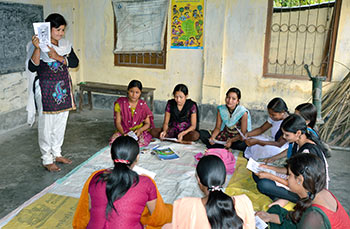 Ultimately, this is a project that the government and the girls themselves will lead. “I would say that this is the most innovative aspect of the whole project, the idea to build on resources and infrastructure that already exists,” said Grout of this partnership.
Ultimately, this is a project that the government and the girls themselves will lead. “I would say that this is the most innovative aspect of the whole project, the idea to build on resources and infrastructure that already exists,” said Grout of this partnership.
She cautions that although this project may not provide all of the answers for all of the difficulties girls face, there is irreplaceable value in the ability to change the dynamic within families and the way they value their girls. Land rights are a fundamental piece of the greater puzzle.
“It’s about connecting the girls to land in their own eyes and in the eyes of their families and communities,” said Grout. “Girls are able to leverage what they get out of the project, particularly the income that they earn, and are able to establish a different footing within their family and use that to get into school. Connecting them to land and allowing them to demonstrate their usefulness – it changes their lives.”
Watch the short documentary film about the project, “After My Garden Grows,” here.
Changemaker
Britt Yamamoto, Ph.D., Executive Director and Founder, iLEAP
By Gailyn Portelance
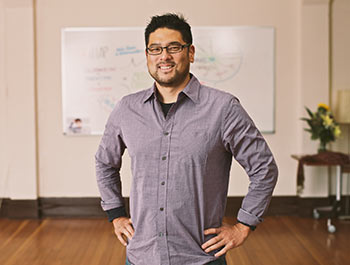 Thanks to a transformative experience in Seattle, community leaders from across Asia, Africa and Latin America are returning to their homes with a renewed sense of who they are, what they do and how best they can develop their communities. They are iLEAP graduates and they are working around the world on some of the most challenging social issues of our time, such as human trafficking, gender-based violence, access to education and sustainable agriculture.
Thanks to a transformative experience in Seattle, community leaders from across Asia, Africa and Latin America are returning to their homes with a renewed sense of who they are, what they do and how best they can develop their communities. They are iLEAP graduates and they are working around the world on some of the most challenging social issues of our time, such as human trafficking, gender-based violence, access to education and sustainable agriculture.
According to Britt Yamamoto, Ph.D., executive director and founder of iLEAP, the focus of his organization is not only on global development issues, but also on the community-based leaders who are working so hard to create change.
“I believe that social leaders are a finite resource, but we often don’t treat them that way, and we don’t tend to their long-term capacity to sustain their work,” said Yamamoto. “At iLEAP, we are about creating social change. That is, shifting social systems around the world. Our strategy is to work with those that are leading these efforts and empower them with not only knowledge and skills, but also the capacity to sustain their work on a personal and professional level.”
Yamamoto, who has worked in the social sector for over 15 years, received his bachelor’s degree in English Literature from the University of Michigan, a master’s degree in Community Development from the University of California at Davis, and later made his way to the Pacific Northwest to earn a Ph.D. in Geography from the University of Washington. He is a Fulbright Fellow who has had the opportunity to interact with a number of grassroots leaders with similar visions of creating change in the world.
Through his global travels, Yamamoto experienced a number of complicated social challenges, and wrestled with how to best approach and transform these issues. Yamamoto’s solution was iLEAP.
“iLEAP is a reflection of the belief that there is a strong relationship between transformative learning and creating social change, and that the best way to tackle any social challenge overseas is by working hand in hand with community-based leaders.”
The type of learning that forms the basis of iLEAP’s programs, one that balances personal inquiry and reflection with social action and collaboration, came from Yamamoto’s belief in the power of integrating personal experience, transformative learning and social application.
“When you invite participants to share personal stories and experiences, it creates a space and opportunity for everyone to share and weave together their narratives into a trusting community” he said. “From that foundation, we can begin to explore our own personal assumptions and socially constructed perspectives on the world and how these often get in the way of our capacity to lead with our full selves. Therefore, the challenge of learning is one of ‘un-learning’ in order to create innovative solutions to the challenges in our world.”
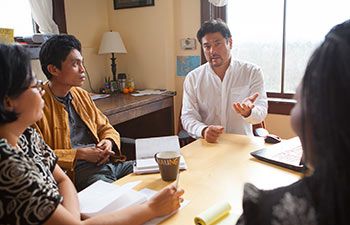 iLEAP, a Global Washington member, has nearly 300 graduates dating back to the inception of its first program launched in 2008, the International Fellowship Program. The graduates, hailing from all over the world and carrying with them the vision of Yamamoto and iLEAP, have returned to their communities and have proved to be successful leaders of social change.
iLEAP, a Global Washington member, has nearly 300 graduates dating back to the inception of its first program launched in 2008, the International Fellowship Program. The graduates, hailing from all over the world and carrying with them the vision of Yamamoto and iLEAP, have returned to their communities and have proved to be successful leaders of social change.
For inspiration for iLEAP’s programs, Yamamoto looks to instances where the development of leadership is essential for social development and transformation. For example, iLEAP created the Social Innovation Forum Japan (SIFJ) after the Tohuku earthquake and tsunami, when Yamamoto saw a critical need for stronger leadership development and cross-cultural skills amongst grassroots leaders.
“I felt that one of the most significant contributions we could make would be to work with that subset of social change leaders in Japan, and help them to better connect to outsides resources, tell their stories and develop a network within their country.”
Yamamoto is also passionate about the importance of renewing social leadership. He metaphorically speaks of fire as a representation of a leader’s ability to enact social transformation, and how leaders are often laden with so many responsibilities – so many ‘logs’ as he describes it – that their flames die down.
“Often when community leaders come to us, their flames are very low,” said Yamamoto. “Part of their renewal is taking logs off the fire, so that more of that air can flow, so that fire can be renewed. The smallest flame, if tended properly, can grow to great brilliance.”
The iLEAP community will surely touch the lives of a growing numbers of citizens in developing communities around the world. Yamamoto is looking forward to expanding and developing very clear regional strategies for Southeast Asia, East Africa, South Asia and Central America to convene and re-convene graduates from these areas.
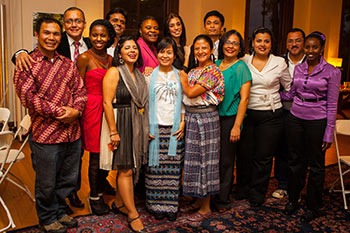 “I’m excited about our work bringing our people back together,” he says. “To bring them together to do work together, share stories, learn and connect around our iLEAP family and identity; and then to send them back to their communities with ‘relit fires.’ It is very important, and is a rare opportunity to amplify our unique work around the world.”
“I’m excited about our work bringing our people back together,” he says. “To bring them together to do work together, share stories, learn and connect around our iLEAP family and identity; and then to send them back to their communities with ‘relit fires.’ It is very important, and is a rare opportunity to amplify our unique work around the world.”
It’s safe to say Yamamoto has truly created a family of change leaders. He talks about how those who graduate from iLEAP programs speak about their experiences and the organization in the same way they would talk about their own families – that there clearly is a place in their hearts for the work that they do.
“This means a lot to me, that it’s authentic. Their human experience has been enlarged, deepened and connected as a result of their interaction with iLEAP’s work. For all that we might say and do in our efforts to change the world, isn’t that what it’s all about?”
You can learn more and get involved with iLEAP by attending one of their many public events throughout the year or becoming a homestay host for its visiting fellows. iLEAP’s next International Fellowship Program runs Oct. 20to Dec. 12.
Member Recognition
World Population Day 2014: Planned Parenthood of the Great Northwest Making an Impact Locally and Globally
By Michelle McMillan
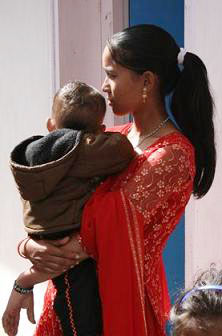 World Population Day was observed on July 11, prompting the international community to think about the effects of population on development, with an emphasis on reproductive health, gender equality and women and youth empowerment.
World Population Day was observed on July 11, prompting the international community to think about the effects of population on development, with an emphasis on reproductive health, gender equality and women and youth empowerment.
The United Nations estimates that the world’s population will reach 8.1 billion in 2025, and will further increase to 9.6 billion in 2050 and 10.9 billion by 2100. The all-time high numbers of children and young people in developing countries present a number of challenges, including the need to provide education and employment. In the least developed countries, where 40 percent of the population is under the age of 15, the problem is even more pressing1.
The UN 2014 Commission on Population and Development concluded that there needs to be emphases on promoting gender equality and empowering girls and young women. The Commission also stressed the importance of sexual and reproductive health and reproductive health rights. While access to sexual and reproductive health care is close to impossible in many parts of the world, addressing these issues and improving conditions is essential to sustainable development and stabilizing population growth.
Global Washington member Planned Parenthood of the Great Northwest (PPGNW) is already well known in the U.S. for tackling these issues and providing affordable sexual and reproductive health care to women, men and teens. However, there is more to Planned Parenthood than its domestic efforts. It also works internationally, partnering with similar organizations to provide affordable reproductive health care in places that need it most. PPGNW aims to expand global access to family planning, prevent unsafe abortions and related health consequences and empower women and youth through sexual and reproductive health education.
Among its global partners is Maternal-Infant Health Annex (MAMI) in the Dominican Republic. MAMI addresses high rates of sexually transmitted infections, HIV and adolescent pregnancy. PPGNW has assisted with teen and peer education training, sexual and reproductive health training, funding support and capacity building since 2010. According to PPGNW, within the first 22 months of the project, the number of young people attending health education sessions increased more than four-fold, and the number of family-planning adolescent clients increased by 315 percent2.
PPGNW has carried out similar programs with local organizations in Ecuador, Cameroon, Lao People’s Democratic Republic and Nepal. The non-profit organization has helped train doctors and nurses in women’s health and guided peer and teen educators in facilitating discussions about sexuality and family planning. Through these programs, PPGNW provides women, men, and teens with critical information about sexual and reproductive health, and access to family planning services.
The work of PPGNW and other similar organizations is not only important to the health of individuals; it is important to overall global development efforts. Stabilizing population growth is a key to sustainable development and will be a part of our post-2015 development agenda. While World Population Day 2014 has come and gone, great challenges remain ahead.
1http://www.unfpa.org/pds/trends.htm
Welcome New Members
Please welcome our newest Global Washington members. Take a moment to familiarize yourself with their work and consider opportunities for support and collaboration!
Global Brigades: Global Brigades is the world’s largest student-led global health and sustainable development organization. Since 2004, Global Brigades has mobilized tens of thousands of university students and professionals through skill-based programs that work in partnership with community members to improve quality of life in under-resourced regions while respecting local culture. https://www.globalbrigades.org/
Member Events
July 16, 2014: Greater Seattle Chamber of Commerce // YPN at TrueNorth Apartments
July 19, 2014: EarthCorps // Pioneer Park: Mercer Island Restoration
July 21-August 8, 2014: One World Now! // Language Camps 2014 Seattle: Arabic and Chinese
July 22, 2014: World Trade Center Seattle // Exporting Opportunities with Ghana
July 23, 2014: Seattle Trade Alliance // Quarterly Member to Member Networking and Trade Update Event
July 25, 2014: RESULTS // Introductory Call
July 26, 2014: Days for Girls International // Annual International Garden Party
July 26, 2014: The Henry M. Jackson School of International Studies, UW // Malam Budaya: A Cultural Night of Indonesian Dance
August 2, 2014: Bastyr University // Summer Open House
August 4-8, 2014: Global Visionaries // Global Leadership Summer Institute 2014
August 5, 2014: World Affairs Council // YPIN Socratic Seminar
August 9, 2014: Woodland Park Zoo // Asian Wildlife Conservation Day
August 9, 2014: NPH USA // Run for NPH
August 11, 2014: Dwankhozi Hope // Garage Sale Fundraiser
August 14, 2014: Washington Women’s Foundation // WWF Coffee and Basics
For more jobs and resources, visit https://globalwa.org/strengthen/careers-in-development/
Career Center
Highlighted Paid Positions
Chief Operating Officer – Landesa
Senior Project Manager – SightLife
Grants Writer – Woodland Park Zoo
Highlighted Volunteer Positions
Volunteer Copy Editor – Landesa
Volunteer – One by One
Highlighted Internship Positions
Fall 2014 World Affairs Council Internship – World Affairs Council
Graduate Level Internship, Maternal and Child Survival Project – PATH
GlobalWA Events
July 16:
New Member Orientation
July 17:
Executive Director Roundtable
July 24:
Networking Happy Hour with Friends of GlobalWA, Humanosphere & the World Affairs Council
December 3, 2014
Global Washington’s 6th Annual Conference
